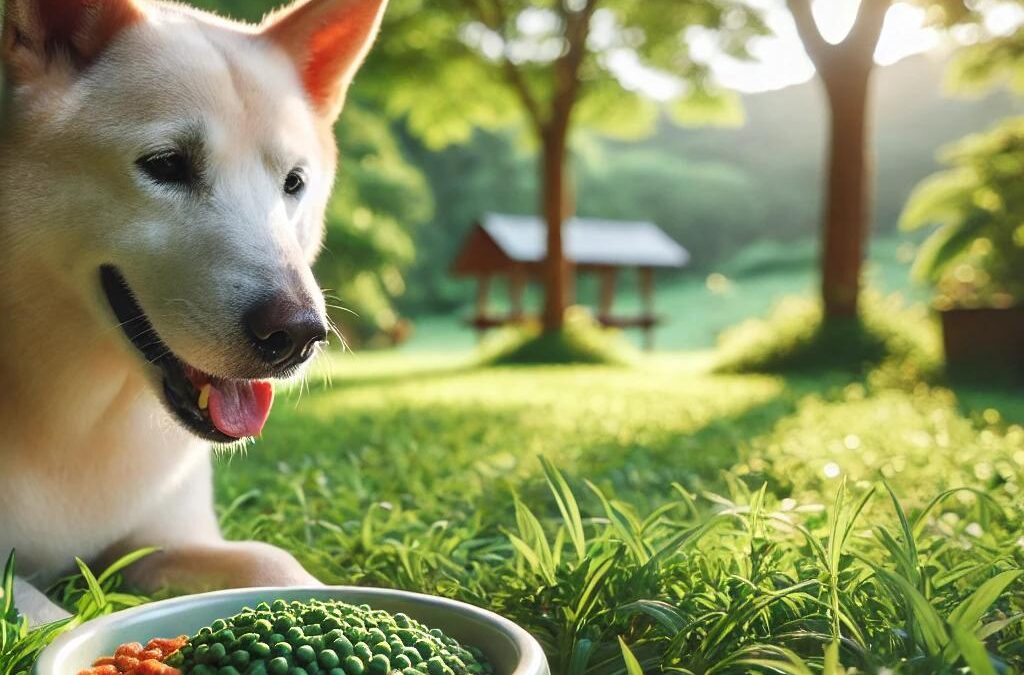
utworzone przez TCMVET | paź 15, 2024 | Żywność i zdrowie
Problemy trawienne u psów, takie jak okresowe wymioty, luźne stolce i nadmiar gazów, są powszechnym zmartwieniem wielu właścicieli zwierząt domowych. Problemy te mogą wynikać z nierównowagi dietetycznej, ukrytych problemów zdrowotnych, a nawet indywidualnych wrażliwości. Określenie pierwotnej przyczyny zaburzeń żołądkowo-jelitowych (GI) u psa ma kluczowe znaczenie dla poprawy jego ogólnego stanu zdrowia i samopoczucia.
Najczęstsze przyczyny problemów trawiennych u psów związane z dietą
- Wysoka zawartość tłuszczu
Dieta zawierająca zbyt dużo tłuszczu może przytłoczyć układ trawienny psa, co prowadzi do luźnych stolców i wymiotów. Tłuszcz jest trudniejszy do strawienia, więc psy o wrażliwych żołądkach mogą mieć trudności z jego prawidłowym przetworzeniem. Zmniejszenie spożycia tłuszczu i wybór chudszych źródeł białka może pomóc złagodzić problemy trawienne.
- Niedobór błonnika
Błonnik odgrywa kluczową rolę w utrzymaniu zdrowego trawienia, promując regularne wypróżnienia i wspierając zdrowie jelit. Diety pozbawione błonnika mogą prowadzić do niespójnych stolców i dyskomfortu trawiennego. Dodanie składników bogatych w błonnik, takich jak dynia lub słodkie ziemniaki, może przynieść ulgę.
- Nietolerancje pokarmowe lub alergie
Niektóre psy mogą mieć nietolerancje pokarmowe lub nietolerancje pokarmowe, zwłaszcza na powszechne alergeny, takie jak zboża, nabiał lub niektóre białka (np. kurczak lub wołowina). Identyfikacja szkodliwego składnika poprzez dietę eliminacyjną może zapobiec przyszłym problemom trawiennym.
- Przejadanie się lub szybkie jedzenie
Psy, które jedzą zbyt szybko lub spożywają duże ilości pokarmu, mogą odczuwać wzdęcia i niestrawność. Spowolnienie czasu posiłków za pomocą podajników-puzzli lub mniejszych porcji może pomóc w zmniejszeniu tych objawów.
Podstawowe zaburzenia zdrowia
Choć dieta odgrywa ważną rolę w trawieniu, inne problemy zdrowotne także mogą przyczyniać się do problemów żołądkowo-jelitowych. Zapalenie trzustki, przerost bakterii lub pasożyty jelitowe mogą powodować przewlekłe problemy trawienne. Konsultacja z weterynarzem w celu wykluczenia chorób podstawowych jest niezbędna, gdy występują uporczywe objawy.
Jak wybrać najlepszą karmę dla psa z wrażliwym żołądkiem
- Wybieraj składniki łatwo przyswajalne
Wybieraj karmy dla psów, które zawierają proste, wysokiej jakości składniki, takie jak chude białka (np. indyk, jagnięcina lub ryba) i pełne ziarna, takie jak brązowy ryż. Są one łagodniejsze dla żołądka psa i łatwiejsze do strawienia.
- Szukaj diet o ograniczonej liczbie składników (LID)
Karmy dla psów LID zawierają mniej składników, co zmniejsza ryzyko wywołania nadwrażliwości pokarmowej lub alergii. Skupiają się na wysokiej jakości białku i ograniczonych źródłach węglowodanów, co czyni je idealnymi dla psów o wrażliwych żołądkach.
- Rozważ probiotyki i prebiotyki
Dodanie probiotyków do diety psa może pomóc zrównoważyć bakterie jelitowe i promować zdrowe trawienie. Błonnik prebiotyczny, znajdujący się w produktach takich jak korzeń cykorii lub pulpa buraczana, również wspiera wzrost pożytecznych bakterii w jelitach.
- Unikaj sztucznych dodatków
Unikaj karmy dla psów zawierającej sztuczne konserwanty, barwniki lub aromaty, ponieważ mogą one nasilać problemy trawienne. Wybieraj naturalne opcje bez konserwantów, kiedy tylko jest to możliwe.
Każdy pies ma wyjątkowe potrzeby dietetyczne i to, co działa u jednego psa, może nie być odpowiednie dla innego. Zrozumienie typowych przyczyn problemów trawiennych i wprowadzenie odpowiednich zmian w diecie psa może znacznie poprawić jego zdrowie trawienne. Zawsze skonsultuj się z lekarzem weterynarii przed wprowadzeniem poważnych zmian w diecie, zwłaszcza jeśli u psa występują objawy przewlekłych problemów trawiennych.

utworzone przez TCMVET | paź 13, 2024 | Żywność i zdrowie
Jako właściciele zwierząt domowych chcemy, aby nasi futrzani towarzysze żyli długo, zdrowo i szczęśliwie. Oprócz tradycyjnej opieki weterynaryjnej wiele osób zwraca się ku naturalnym, holistycznym metodom promowania dobrego samopoczucia u zwierząt domowych. To podejście obejmuje wszystko, od zbilansowanego odżywiania i suplementów ziołowych po tworzenie środowiska wolnego od stresu. W tym artykule przyjrzymy się różnym naturalnym sposobom na poprawę zdrowia Twojego zwierzaka, włączając zalety Tradycyjnej Medycyny Chińskiej (TCM), naturalnych środków zaradczych i zmian w stylu życia, aby uzyskać kompleksowe podejście do dobrego samopoczucia zwierząt domowych.
Dlaczego holistyczne zdrowie jest ważne dla zwierząt domowych
Holistyczna opieka nad zwierzętami domowymi obejmuje całe zwierzę — ciało, umysł i ducha — zamiast skupiać się tylko na objawach. Łącząc naturalne środki zaradcze z dobrym odżywianiem i regularnymi ćwiczeniami, możesz zapobiegać problemom zdrowotnym, zanim się pojawią, i poprawić ogólną jakość życia swojego zwierzaka. Holistyczna opieka może wzmocnić układ odpornościowy Twojego zwierzaka, wspierać długoterminowe dobre samopoczucie, a nawet zmniejszać stres i niepokój.
Kluczowe elementy naturalnej pielęgnacji zwierząt domowych
- Naturalne i Zrównoważone Odżywianie
Prawidłowe odżywianie jest podstawą zdrowego życia Twojego pupila. Zapewnienie diety bogatej w pełnowartościowe produkty, chude białka i niezbędne składniki odżywcze może zwiększyć energię i układ odpornościowy Twojego pupila.
- Całe jedzenie:Wprowadź do diety swojego pupila świeże warzywa i owoce, takie jak marchewki, borówki i słodkie ziemniaki.
- Chude białkoWybieraj wysokiej jakości mięso, takie jak kurczak, indyk lub ryby, które dostarczają niezbędnych aminokwasów potrzebnych do utrzymania mięśni i ogólnej witalności.
- Zdrowe tłuszcze:Włącz do swojej diety kwasy tłuszczowe omega-3 i omega-6 zawarte w olejach rybich i siemieniu lnianym, aby zapewnić sobie lśniącą sierść, zdrowie mózgu i prawidłowe funkcjonowanie stawów.
- Suplementy ziołowe wspomagające zdrowie
Ziołowe środki lecznicze to doskonały naturalny sposób na wsparcie zdrowia Twojego pupila. Wiele ziół stosowanych w Tradycyjnej Medycynie Chińskiej (TCM) i zachodnim ziołolecznictwie oferuje korzyści, takie jak zmniejszanie stanu zapalnego, wzmacnianie odporności i łagodzenie lęku.
- Kurkuma:Kurkuma, znana ze swoich właściwości przeciwzapalnych, może pomóc w łagodzeniu bólu związanego z zapaleniem stawów i poprawie zdrowia stawów.
- Rumianek:Zioło to doskonale łagodzi problemy trawienne i uspokaja niespokojne zwierzęta.
- Rehmannia (Di Huang):Zioło to, stosowane w tradycyjnej medycynie chińskiej, odżywia krew i wspomaga zdrowie nerek, dzięki czemu jest idealne dla starszych zwierząt domowych.
- Ożywić:Imbir to naturalne zioło przeciw nudnościom, świetnie nadaje się dla zwierząt domowych cierpiących na rozstrój żołądka i wspomaga prawidłowe trawienie.
- Tradycyjna Medycyna Chińska (TCM) dla Zwierząt Domowych
Tradycyjna medycyna chińska oferuje holistyczne podejście do zdrowia poprzez równoważenie Qi (energii) ciała i promowanie harmonii w systemie. TCM jest powszechnie stosowana w leczeniu przewlekłych schorzeń u zwierząt domowych i wzmacnianiu ich naturalnych zdolności leczniczych.
- Lubczyk syczuański (Chuan Xiong):Zioło to poprawia krążenie, pomaga zmniejszyć ból i łagodzi stany zapalne, zwłaszcza u zwierząt cierpiących na bóle stawów lub zapalenie stawów.
- Wiciokrzew (Jin Yin Hua):Dzięki swoim właściwościom przeciwzapalnym i przeciwdrobnoustrojowym wiciokrzew jest stosowany do usuwania nadmiaru ciepła i toksyn z organizmu, pomagając zwierzętom domowym w walce z infekcjami i problemami skórnymi.
- Astragalus (Huang Qi): Astragalus wzmacnia układ odpornościowy, wspiera wątrobę i podnosi poziom energii. Często jest stosowany jako środek zapobiegawczy dla ogólnej witalności.
- Ćwiczenia i stymulacja psychiczna
Regularna aktywność fizyczna jest kluczowa dla utrzymania Twojego pupila w dobrej kondycji i zdrowiu. Ćwiczenia wspomagają zdrowie układu sercowo-naczyniowego, utrzymują napięcie mięśni i zapobiegają otyłości. Ale stymulacja umysłowa jest równie ważna — utrzymywanie umysłu Twojego pupila w dobrej kondycji może zapobiec nudzie i destrukcyjnym zachowaniom.
- Codzienne spacery:Zapewnij swojemu psu co najmniej 30 minut aktywności fizycznej dziennie, aby utrzymać zdrową wagę i silne mięśnie.
- Zabawki interaktywne: Stymuluj umysł swojego pupila zabawkami-łamigłówkami lub grami szkoleniowymi. Koty mogą lubić zabawki z piór, podczas gdy psy mogą preferować zabawki do aportowania lub dozowania smakołyków.
- Redukcja stresu i tworzenie spokojnego otoczenia
Podobnie jak ludzie, zwierzęta domowe doświadczają stresu. Przewlekły stres może wpływać na ich układ odpornościowy, trawienie i ogólny nastrój. Stworzenie uspokajającego środowiska i zmniejszenie lęku u Twojego zwierzaka może znacznie poprawić jego zdrowie.
- Aromaterapia: Użyj uspokajających zapachów, takich jak lawenda lub rumianek, aby stworzyć kojące środowisko. Olejki eteryczne mogą pomóc uspokoić niespokojne zwierzęta, ale upewnij się, że są bezpieczne dla zwierząt.
- Rutyna i spójność: Zwierzęta domowe rozwijają się przy rutynie. Regularne karmienie, zabawa i odpoczynek pomagają zmniejszyć stres i zapewniają poczucie bezpieczeństwa.
- Naturalne środki uspokajające:Naturalne produkty takie jak olejek CBD, korzeń kozłka lekarskiego czy środki ratunkowe mogą pomóc uspokoić zwierzęta cierpiące na lęk, zwłaszcza w czasie stresujących sytuacji, takich jak wizyta u weterynarza czy burza.
Holistyczne zdrowie dla starszych zwierząt domowych
W miarę starzenia się zwierząt domowych zmieniają się ich potrzeby. Holistyczna opieka może odegrać znaczącą rolę w poprawie jakości życia starszych zwierząt domowych. Suplementy na stawy, pokarmy bogate w przeciwutleniacze i zioła wspomagające pracę nerek i wątroby mogą zdziałać cuda.
- Glukozamina i Chondroityna:Te suplementy pomagają utrzymać zdrowie stawów i łagodzą ból spowodowany zapaleniem stawów u starszych zwierząt domowych.
- Pokarmy bogate w przeciwutleniacze:Borówki, żurawiny i szpinak są bogate w przeciwutleniacze, które zwalczają wolne rodniki i zmniejszają ryzyko chorób związanych z wiekiem.
- Wsparcie ziołowe:Zioła takie jak rehmannia I traganek może odżywiać i wzmacniać nerki i wątrobę – organy szczególnie narażone na uszkodzenia u starszych zwierząt.
Naturalne wzmocnienie zdrowia Twojego pupila obejmuje połączenie odpowiedniego odżywiania, ćwiczeń, wsparcia ziołowego i redukcji stresu. Przyjmując holistyczne podejście do opieki nad zwierzętami, możesz pomóc zapewnić, że Twój pies lub kot pozostanie zdrowy, szczęśliwy i pełen witalności przez wiele lat. Zawsze skonsultuj się z lekarzem weterynarii przed wprowadzeniem jakichkolwiek nowych suplementów ziołowych lub zmianami w rutynie Twojego pupila, szczególnie w przypadku zwierząt z wcześniej istniejącymi schorzeniami.

utworzone przez TCMVET | paź 12, 2024 | Żywność i zdrowie
Gdy u kota zostanie zdiagnozowany nowotwór, zapewnienie mu odpowiedniego odżywiania staje się istotną częścią opieki. Chociaż koty są znane ze swoich wybrednych nawyków żywieniowych, dieta dostosowana do ich specyficznych potrzeb w czasie choroby może mieć znaczący wpływ na ich zdrowie i poprawę jakości życia. Oto kilka podstawowych wskazówek, które zapewnią Twojemu kotu składniki odżywcze, których potrzebuje w walce z nowotworem.
1. Skup się na wysokiej jakości, łatwo przyswajalnych białkach
Koty chore na raka potrzebują wysokiej jakości białek, aby utrzymać masę mięśniową i poziom energii. Wybieraj łatwo przyswajalne źródła białka, takie jak ryby, kurczak lub indyk, które dostarczają niezbędnych składników odżywczych bez dodatkowego obciążenia układu trawiennego. Białko pomaga kotu pozostać silnym i zwalczać negatywne skutki raka.
2. Mało węglowodanów, dużo tłuszczów
Węglowodany mogą napędzać wzrost komórek rakowych, dlatego najlepiej jest ograniczyć spożycie węglowodanów w diecie kota. Zamiast tego skup się na zdrowych tłuszczach, które dostarczają energii i pomagają utrzymać masę ciała. Kwasy tłuszczowe omega-3, znajdujące się w oleju rybim, są szczególnie korzystne ze względu na swoje właściwości przeciwzapalne, wspomagające układ odpornościowy i zmniejszające stany zapalne.
3. Małe, częste posiłki
U kotów chorych na raka może wystąpić utrata apetytu lub nudności podczas leczenia. Oferowanie małych, częstych posiłków może zachęcić kota do jedzenia bez przytłaczania go. Jeśli kot ma problem z utrzymaniem zainteresowania jedzeniem, spróbuj je lekko podgrzać, aby wzmocnić zapach i uczynić je bardziej atrakcyjnym.
4. Wzbogać dietę o przeciwutleniacze
Antyoksydanty pomagają chronić komórki organizmu przed uszkodzeniem, co jest kluczowe podczas leczenia raka. Włączenie produktów bogatych w przeciwutleniacze, takich jak jagody, lub suplementacja witaminami C i E może pomóc w utrzymaniu układu odpornościowego kota. Jednak zawsze skonsultuj się z lekarzem weterynarii przed wprowadzeniem nowych produktów spożywczych lub suplementów.
5. Nawodnienie jest kluczem
Rak i jego leczenie mogą prowadzić do odwodnienia, dlatego ważne jest, aby utrzymać kota w stanie nawodnienia. Mokra karma może zapewnić zarówno nawodnienie, jak i odżywianie, a do posiłków kota można również dodać bulion o niskiej zawartości sodu, aby zachęcić go do przyjmowania wody. Prawidłowe nawodnienie wspomaga pracę nerek i ogólne samopoczucie.
6. Skonsultuj się z lekarzem weterynarii w celu uzyskania spersonalizowanych suplementów
Niektóre suplementy, takie jak kwasy tłuszczowe omega-3, probiotyki i enzymy trawienne, mogą być pomocne w utrzymaniu zdrowia kota podczas leczenia raka. Jednak potrzeby każdego kota są inne, dlatego ważne jest, aby współpracować z lekarzem weterynarii w celu ustalenia odpowiednich suplementów i dawek dla kota.
7. Monitoruj wagę i stan swojego kota
Regularne monitorowanie wagi i kondycji ciała kota jest kluczowe podczas leczenia raka. Koty mogą szybko tracić na wadze podczas walki z chorobą, dlatego ważne jest dostosowanie ich diety do zmieniających się potrzeb. Jeśli utrata wagi stanie się problemem, weterynarz może zalecić konkretne wysokokaloryczne pokarmy lub suplementy, które pomogą.
Opieka nad kotem chorym na raka wymaga dbałości o szczegóły, jeśli chodzi o jego dietę. Skupienie się na wysokiej jakości białkach, minimalizowanie węglowodanów i włączanie zdrowych tłuszczów i przeciwutleniaczy może mieć duże znaczenie dla ogólnego zdrowia kota. Zawsze skonsultuj się z lekarzem weterynarii, aby stworzyć spersonalizowany plan żywieniowy, który uwzględnia wyjątkowe potrzeby kota i pomaga mu zachować jak największe zdrowie i komfort podczas leczenia.

utworzone przez TCMVET | paź 12, 2024 | Żywność i zdrowie
Wiele kotów i psów odczuwa niepokój i stres, gdy są narażone na głośne dźwięki, burze, nieznajomych ludzi lub inne zwierzęta. Jako właściciel zwierzęcia domowego, możesz być przygnębiony, widząc swojego ukochanego pupila w takim dyskomforcie, ale dobrą wiadomością jest to, że istnieją naturalne i bezpieczne rozwiązania, które pomogą złagodzić jego niepokój. Od technik szkoleniowych po środki homeopatyczne, istnieje wiele sposobów na wsparcie Twojego niespokojnego zwierzaka.
1. Szkolenie i ćwiczenia posłuszeństwa
Jednym z najskuteczniejszych sposobów radzenia sobie z lękiem u Twojego pupila jest szkolenie w zakresie posłuszeństwa i regularne ćwiczenia. Szkolenie pomaga stworzyć strukturę, która może złagodzić stres, zapewniając Twojemu pupilowi poczucie bezpieczeństwa. Ponadto aktywność fizyczna uwalnia endorfiny, promując spokój i redukując energię nerwową.
2. Zabawki skupiające uwagę i nauka korzystania z klatki
Interaktywne zabawki i puzzle mogą odwrócić uwagę Twojego pupila od jego niepokoju, angażując go psychicznie. Trening w klatce zapewnia również bezpieczną przestrzeń, do której Twój pupil może się wycofać w stresujących sytuacjach, takich jak burze lub gdy odwiedzają go goście. Klatka zapewnia poczucie bezpieczeństwa, pomagając Twojemu pupilowi czuć się mniej narażonym.
3. Ton głosu
Sposób, w jaki wchodzisz w interakcję ze swoim pupilem, odgrywa znaczącą rolę w jego uspokojeniu. Uspokajający, spokojny ton głosu może pomóc zapewnić Twojemu pupilowi, że wszystko jest pod kontrolą. Unikaj podnoszenia głosu lub zachowywania się niespokojnie, ponieważ zwierzęta są bardzo wrażliwe na ludzkie emocje.
4. Środki homeopatyczne
Środki homeopatyczne to delikatny, naturalny sposób radzenia sobie z lękiem u zwierząt domowych. Środki te są bezpieczne do codziennego stosowania w celu radzenia sobie z ogólnym lękiem i mogą być podawane w większych dawkach podczas stresujących wydarzeń. Podawanie homeopatii przed stresującą sytuacją, taką jak wizyta u weterynarza lub fajerwerki, może być szczególnie skuteczne, ponieważ uspokojenie zwierzęcia może być trudne, gdy stres już się zacznie.
5. Esencje kwiatowe
Esencje kwiatowe działają na poziomie emocjonalnym i są bardzo skuteczne w zmniejszaniu stresu i lęku u zwierząt domowych. Te formuły zawierają energetyczną esencję kwiatów, która może łagodzić emocje. Zwierzęta domowe są szczególnie podatne na te oparte na energii zabiegi, a esencje kwiatowe są łagodne i bezpieczne do długotrwałego stosowania.
6. Formuły ziołowe
Środki ziołowe, choć działają wolniej niż homeopatia lub esencje kwiatowe, oferują długotrwałe korzyści. Suplementy ziołowe można przyjmować codziennie, aby naturalnie zmniejszać stres i niepokój z czasem, promując poczucie spokoju.
7. Thundershirt: Unikalne rozwiązanie
Thundershirt to kreatywne i sprawdzone rozwiązanie dla niespokojnych zwierząt. Ta ściśle dopasowana koszulka wywiera delikatny nacisk, podobny do owijania dziecka, co pomaga zwierzętom czuć się bezpiecznie. Jest szczególnie pomocna podczas burz, fajerwerków lub innych wydarzeń wywołujących niepokój.
Niezależnie od tego, czy jest to szkolenie, naturalne środki zaradcze, czy też wyjątkowe narzędzia, takie jak Thundershirt, istnieje wiele bezpiecznych i skutecznych opcji, które pomogą złagodzić niepokój Twojego pupila. Będąc proaktywnym i zapewniając wspierające środowisko, możesz pomóc swojemu kotu lub psu poczuć się spokojniejszym i bardziej bezpiecznym w stresujących sytuacjach.

utworzone przez TCMVET | paź 12, 2024 | Żywność i zdrowie
Zdrowe serce jest kluczowe dla ogólnego samopoczucia Twojego pupila. Serce pracuje niestrudzenie, bijąc średnio około 100 razy na minutę, zapewniając krążenie tlenu, składników odżywczych, hormonów i niezbędnych komórek w całym ciele. Biorąc pod uwagę tę ważną rolę, ważne jest, aby właściciele zwierząt domowych wspierali zdrowie serca swojego zwierzęcia poprzez odpowiednie odżywianie i regularne ćwiczenia.
1. Regularne ćwiczenia: wzmacniają serce
Ćwiczenia nie służą tylko utrzymaniu masy ciała Twojego pupila; są niezbędne dla zdrowia układu sercowo-naczyniowego. Regularna aktywność fizyczna wzmacnia mięsień sercowy, pomaga regulować ciśnienie krwi i utrzymuje krążenie w sprawności. Niezależnie od tego, czy jest to codzienny spacer dla Twojego psa, czy interaktywne sesje zabaw dla Twojego kota, ćwiczenia utrzymują serce i ciało Twojego pupila silnymi i zdrowymi.
2. Dieta zdrowa dla serca: klucz do długowieczności
Dieta Twojego pupila jest jednym z najważniejszych czynników zapewniających zdrowie serca. Dieta bogata w witaminy, składniki odżywcze i białko pomoże mu utrzymać zdrową masę ciała, zmniejszyć stan zapalny i wspomóc pracę serca. Unikaj karmienia swojego pupila karmą zawierającą kukurydzę, pszenicę lub soję, ponieważ są to powszechne alergeny dla kotów i psów. Na wolności Twój pupil nigdy nie zjadłby tych zbóż, a wiele zwierząt doświadcza reakcji alergicznych, co prowadzi do problemów trawiennych, takich jak wymioty lub biegunka.
Ponadto wiele zwierząt domowych ma alergię na białka, takie jak kurczak, indyk i kaczka. Alergie te mogą również prowadzić do problemów żołądkowo-jelitowych i stanów zapalnych, które mogą negatywnie wpływać na zdrowie serca. Wybieraj wysokiej jakości, odpowiednie dla gatunku źródła białka, które rzadziej powodują reakcje alergiczne, i skonsultuj się z lekarzem weterynarii w celu uzyskania najlepszych opcji dietetycznych.
3. Unikaj powszechnych alergenów: kukurydzy, pszenicy, soi i niektórych białek
Jako odpowiedzialni właściciele zwierząt domowych, ważne jest, aby uważnie czytać etykiety karmy dla swojego pupila. Wypełniacze na bazie zbóż, takie jak kukurydza, pszenica i soja, mają niewielką wartość odżywczą i są powszechnymi alergenami dla zwierząt domowych. Ponadto wiele przetworzonych karm dla zwierząt zawiera produkty uboczne pochodzenia drobiowego, które mogą wywoływać reakcje alergiczne u niektórych zwierząt. Wyeliminowanie tych składników z diety Twojego pupila może zmniejszyć stan zapalny, poprawić trawienie i wspierać ogólne zdrowie serca.
4. Suplementy diety dla zdrowia serca
Oprócz zbilansowanej diety, rozważ włączenie suplementów wspomagających serce do diety swojego pupila. Kwasy tłuszczowe omega-3, znajdujące się w oleju rybim, są znane ze zmniejszania stanów zapalnych i wspomagania funkcji układu sercowo-naczyniowego. Tauryna, aminokwas, jest szczególnie ważna dla kotów, ponieważ wspomaga prawidłową pracę mięśnia sercowego. Zawsze skonsultuj się z lekarzem weterynarii przed dodaniem jakichkolwiek suplementów do diety swojego pupila, aby upewnić się, że otrzymuje on odpowiednie składniki odżywcze w odpowiednich ilościach.
Zapewniając swojemu pupilowi regularne ćwiczenia, zbilansowaną dietę wolną od powszechnych alergenów i odpowiednie suplementy, możesz wspierać zdrowie jego serca i zapewnić mu długie, zdrowe życie. Pamiętaj, że serce Twojego pupila ciężko pracuje każdego dnia — to od Ciebie zależy, czy zapewnisz mu niezbędne wsparcie odżywcze i fizyczne.

utworzone przez TCMVET | paź 11, 2024 | Żywność i zdrowie
Gdy u psa zostanie zdiagnozowany nowotwór, utrzymanie zdrowej wagi staje się krytyczną częścią ogólnego planu opieki. Nowotwór może często prowadzić do utraty wagi z powodu takich czynników, jak słaby apetyt, zanik mięśni i zwiększone zapotrzebowanie metaboliczne organizmu. Zapewnienie psu utrzymania lub przybrania na wadze może poprawić jego jakość życia, wzmocnić jego funkcje odpornościowe i wesprzeć skuteczność leczenia raka. W tym artykule przyjrzymy się praktycznym strategiom, które pomogą psom z nowotworem przybrać i utrzymać wagę.
Zrozumienie utraty wagi u psów chorych na raka
Utrata masy ciała u psów chorych na raka może wynikać z kilku czynników:
- Utrata apetytuLeczenie raka, na przykład chemioterapia i radioterapia, może powodować nudności, przez co pies traci apetyt.
- Wyniszczenie nowotworowe: Ten stan powoduje utratę mięśni i tłuszczu, nawet gdy pies zjada wystarczającą ilość kalorii. Wyniszczenie jest spowodowane zmianami metabolicznymi, które rak wywołuje w organizmie.
- Zwiększone zapotrzebowanie na kalorieOrganizm często spala więcej kalorii podczas walki z rakiem, co utrudnia psom utrzymanie masy ciała.
Biorąc pod uwagę te wyzwania, zapewnienie psu odpowiedniego odżywiania i opieki może mieć znaczący wpływ na jego zdrowie i rekonwalescencję.
Skuteczne strategie na przybieranie na wadze u psów chorych na raka
- Dieta wysokiej jakości i wysokokaloryczna Jednym z najskuteczniejszych sposobów na zwiększenie masy ciała jest zaoferowanie psu diety wysokokalorycznej i bogatej w składniki odżywcze. Skup się na karmieniu:
- Produkty bogate w białko:Białko jest niezbędne do utrzymania masy mięśniowej, którą rak może szybko wyczerpać. Wybieraj chude mięso, takie jak kurczak, indyk lub ryba, a także bogate w białko jaja.
- Zdrowe tłuszcze: Tłuszcze są skoncentrowanym źródłem kalorii. Kwasy tłuszczowe omega-3, znajdujące się w oleju rybim lub oleju lnianym, są szczególnie korzystne dla psów z rakiem, ponieważ mogą pomóc zmniejszyć stan zapalny i wspierać zdrowie układu odpornościowego.
- Węglowodany złożone:Chociaż psom chorym na raka może pomóc mniejsza ilość węglowodanów, ponieważ komórki rakowe często żywią się cukrami, oferowanie im opcji o niskim indeksie glikemicznym, takich jak słodkie ziemniaki i brązowy ryż, może dostarczyć im energii bez powodowania gwałtownego wzrostu poziomu cukru we krwi.
- Częste, małe posiłki Psy poddawane leczeniu raka często mają zmniejszony apetyt. Oferowanie mniejszych, częstszych posiłków może zachęcić je do jedzenia większej ilości w ciągu dnia. Unikaj przytłaczania psa dużymi porcjami, a zamiast tego skup się na spójności i jakości dostarczanych posiłków.
- Suplementy na przyrost masy ciała Rozważ dodanie do posiłków suplementów na przyrost masy ciała przeznaczonych dla psów. Mogą one stanowić skoncentrowane źródło kalorii i niezbędnych składników odżywczych wspomagających masę mięśniową. Twój weterynarz może zalecić produkty takie jak:
- Odżywczy Cal:Wysokokaloryczny suplement zwiększający energię i wspomagający przyrost masy ciała.
- Olej rybny:Bogaty w kwasy omega-3, pomaga utrzymać zdrową wagę i zmniejsza stany zapalne.
- Probiotyki:Wspieranie zdrowia jelit może poprawić trawienie i wchłanianie składników odżywczych, dzięki czemu Twój pies będzie mógł łatwiej przybrać na wadze.
- Appetite Stimulants Jeśli Twój pies ma brak apetytu, zapytaj weterynarza o możliwość stosowania środków pobudzających apetyt. Leki takie jak Mirtazapina Lub Entycja można przepisać, aby zachęcić psa do jedzenia większej ilości pokarmu, co pomoże zapobiec niepożądanej utracie wagi w trakcie leczenia.
- Domowe odżywki wzmacniające Niektórzy właściciele psów odnoszą sukcesy, przygotowując domowe posiłki, które są zarówno wysokokaloryczne, jak i atrakcyjne dla ich psów. Oto kilka pomysłów, które pomogą pobudzić apetyt psa, a jednocześnie zapewnią mu potrzebne składniki odżywcze:
- Gotowany kurczak lub indyk:Aby poprawić smak, dodaj odrobinę bulionu z kurczaka.
- Jajka:Jajecznica lub jajka sadzone na krótko są doskonałym źródłem białka.
- Dynia lub słodkie ziemniaki:Łatwe do strawienia i bogate w składniki odżywcze.
- Serek wiejski lub jogurt naturalny:Bogaty w białko i delikatny dla żołądka.
- Leki przeciwwymiotne Leczenie raka często może powodować nudności, które zniechęcają psy do jedzenia. Leki przeciwwymiotne, takie jak Cerenia może pomóc w opanowaniu nudności i wymiotów, zachęcając psy do jedzenia większej ilości pokarmu i odzyskując apetyt.
- Minimalizuj stres Stres może zmniejszyć apetyt psa, dlatego ważne jest stworzenie spokojnego, komfortowego otoczenia dla swojego pupila. Zapewnij spokojną przestrzeń, w której pies może jeść bez przeszkód i czuć się bezpiecznie. Rozważ włączenie delikatnych aktywności, masażu lub spędzenie jakościowego czasu ze swoim pupilem, aby zmniejszyć jego poziom lęku, co może również pozytywnie wpłynąć na jego apetyt.
Monitorowanie wagi i postępów Twojego psa
Regularne monitorowanie wagi i kondycji ciała psa jest kluczowe. Waż go co tydzień, aby śledzić postępy, i skonsultuj się z weterynarzem, jeśli mimo Twoich wysiłków nadal traci na wadze. Ponadto obserwuj poziom energii, apetyt i ogólny nastrój psa, ponieważ mogą one wskazywać, jak dobrze działają wybrane przez Ciebie strategie.
Weterynarz może również zalecić regularne badania krwi, aby upewnić się, że pies otrzymuje odpowiednie odżywianie i że leczenie przeciwnowotworowe nie wpływa na jego zdolność do utrzymania prawidłowej masy ciała.
Pomaganie psu z rakiem w utrzymaniu lub przybieraniu na wadze jest krytyczną częścią ogólnego planu leczenia. Skupiając się na wysokiej jakości odżywianiu, oferując mniejsze, częste posiłki i stosując środki pobudzające apetyt lub suplementy w razie potrzeby, możesz wspierać wysiłki psa w przybieraniu na wadze. Zawsze ściśle współpracuj ze swoim lekarzem weterynarii, aby stworzyć dostosowany plan żywieniowy, który spełni specyficzne potrzeby Twojego psa w trakcie leczenia raka.






